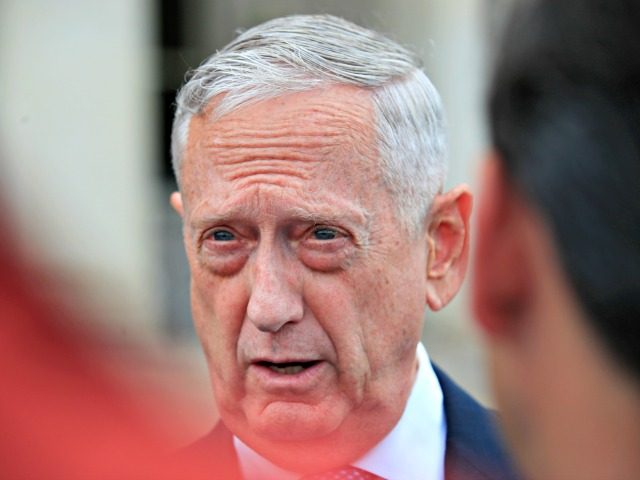Former Secretary of Defense Jim Mattis is a thoughtful fellow, even if his interpretation of the “rules-based international order” shows a certain lack of vision.
In fact, both sides of his intellectual persona—the heterodox side and the orthodox side—are on display in an excerpt from his post-Trump administration memoir, Call Sign Chaos: Learning to Lead, appearing Thursday in the Wall Street Journal.
Mattis enjoyed a storied career in the Marine Corps, participating in many conflicts, rising to the rank of four-star general. He was also something of a scholar; his nickname was “Warrior Monk.” And so, interestingly, in that Journal excerpt, he puts great emphasis on an idea that’s only indirectly related to combat, namely, the need for unity on the home front. As he writes:
What concerns me most as a military man is not our external adversaries; it is our internal divisiveness. We are dividing into hostile tribes cheering against each other, fueled by emotion and a mutual disdain that jeopardizes our future, instead of rediscovering our common ground and finding solutions.
Mattis, being notoriously well read, knows that history bears him out on the need for domestic harmony. Arnold Toynbee demonstrated, in his magisterial 12-volume Study of History, that most civilizations have failed through internal strife, as opposed to foreign conquest.
So Mattis is right-on when he writes, “On each of our coins is inscribed America’s de facto motto, “E Pluribus Unum”—from many, one. For our experiment in democracy to survive, we must live that motto.”
In addition, Mattis appreciates the value of iconoclastic thinking within his own Marine Corps:
Beneath its Prussian exterior of short haircuts, crisp uniforms and exacting standards, the Corps nurtured some of the strangest mavericks and most original thinkers I encountered in my journey through multiple commands and dozens of countries. The Marines’ military excellence does not suffocate intellectual freedom or substitute regimented dogma for imaginative solutions. They know their doctrine, often derived from lessons learned in combat and written in blood, but refuse to let that turn into dogma.
Mattis might be recalling, for instance, a 1989 article in the Marine Corps Gazette introducing the concept of “Fourth Generation Warfare”—that is, particle-sized fighting committed by non-traditional combatants. This think-piece appeared a dozen years before the terrorist attacks of 9/11.
Indeed, given the fact that Mattis’s military call sign was “Chaos,” one might expect that he would more greatly appreciate the value of breaking with, as needed, intellectual orthodoxy. That is, one can always maintain a basic commitment to the idea of rules-based alliances and an overall international order and yet still see the need sometimes to go outside the nine dots.
And if Mattis had possessed that sort of flexibility, perhaps he would have agreed with his former boss, President Trump, on the need to rethink NATO, as well as our defense commitments to Japan and South Korea—and our involvement in the “endless wars” of Afghanistan, Iraq, and Syria.
Instead, it was Mattis’s unwillingness to consider such unorthodox thoughts that led him to resign his Pentagon post late last year. His resignation was honorable, and the excerpt we see in the Journal is respectful—even as Mattis makes plain his differences with the 45th president.
In other words, in the slow-motion, not-so-quiet struggle between Trump and the Establishment, Mattis chose the Establishment. For decades now, that Establishment has decreed that every region, every country—indeed, just about everything—is a “vital interest” that the U.S. must defend. Or, as the case may be, attack.
Needless to say, the agenda of this Establishment—sometimes known as “The Blob”—is not only open-ended, but also costly, in terms of both blood and treasure.
Trump has been the first commander-in-chief to say out loud that this globalist agenda is too expensive. And so, he has sought to renegotiate this expense, however fitfully, with our allies—who, of course, are reluctant to spend more when they know that America will protect them, no matter what.
Moreover, Trump has crossed the Establishment in other ways, as well. He has actively sought better relations with the rogue nation of North Korea, reasoning that if Kim Jong-un has nuclear weapons and is never going to give them up, then it makes little sense to keep pounding the same stale talking point about his disarming.
Instead, it’s smart at least to be on good terms with him. Nuclear weapons might be safest when they are deactivated, but they are also safe when they are not used.
It’s that sort of fresh thinking that seems to have rankled Mattis. So for all his erudition on history, and for all his willingness to “go chaos” on occasion, Mattis seems to be a happy adherent to Establishment orthodoxy.
And that’s why he’s no longer in Trump’s Cabinet.

COMMENTS
Please let us know if you're having issues with commenting.